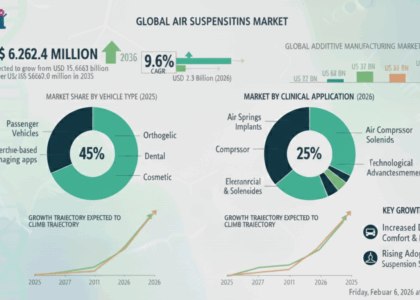The renal biomarker market has become an essential part of the healthcare sector, particularly in the diagnosis and management of kidney-related diseases. Renal biomarkers are biological molecules found in blood or urine that indicate the presence, progression, or severity of kidney dysfunction. The rising prevalence of chronic kidney disease (CKD), acute kidney injury (AKI), and other renal disorders has significantly increased the demand for these biomarkers. They provide clinicians with critical information for early diagnosis, monitoring, and treatment response evaluation, which ultimately improves patient outcomes. The renal biomarker market is gaining momentum as medical science advances and more precise diagnostic tools become necessary for managing renal health effectively.
Future Market Insights’ updated report on the renal biomarker ecosystem highlights various opportunities and growth spots for the coming decade. As per the analysis, the renal biomarker market is set to account for a current valuation of USD 1,541.2 million in 2024.
Renal biomarkers also play a pivotal role in pharmaceutical research, helping in drug development by enabling early detection of nephrotoxicity, which can accelerate the process of developing safer medications. The increasing emphasis on personalized medicine has further amplified the importance of these biomarkers in tailoring treatments based on individual patient profiles. Overall, the renal biomarker market stands at the intersection of clinical need and technological innovation, promising substantial growth potential in the coming years.
Get Sample Report: – https://www.futuremarketinsights.com/reports/sample/rep-gb-1731
Size & Trends
The renal biomarker market has been expanding steadily, supported by advancements in biotechnology and growing awareness about the importance of early kidney disease detection. One of the dominant trends in this market is the shift from traditional diagnostic methods, which often involve invasive biopsies, to non-invasive biomarker-based tests. This shift is driven by the need for quicker, more accurate, and less painful diagnostic options that can be easily administered in outpatient settings.
The demand for high-sensitivity and high-specificity biomarkers is increasing as healthcare providers aim to reduce false positives and negatives, which can lead to improper treatment. Emerging biomarkers that provide insights into the molecular mechanisms underlying kidney damage are gaining interest due to their potential to enhance diagnosis and treatment decisions.
Technological integration, such as the use of point-of-care testing and digital platforms for biomarker analysis, is another important trend. These developments facilitate faster results and better patient monitoring, which is critical in managing chronic conditions like CKD.
The growing global burden of kidney diseases, driven by factors such as diabetes, hypertension, and aging populations, is a significant growth catalyst. The renal biomarker market is evolving not only in developed countries but also gaining traction in emerging economies, where rising healthcare investments and improved diagnostic infrastructure are opening new avenues.
Key Highlights
Several key highlights define the current landscape of the renal biomarker market. Foremost is the increasing integration of multi-biomarker panels, which combine several markers to improve diagnostic accuracy and prognostic capabilities. This approach reduces reliance on single biomarkers, which may have limitations in sensitivity or specificity.
Another highlight is the expanding application of renal biomarkers beyond diagnostics, including their use in drug safety assessments and clinical trials. These applications help reduce the risk of kidney damage caused by certain medications by enabling early detection of nephrotoxicity.
Collaborations between diagnostic companies, research institutions, and pharmaceutical firms are fostering innovation and accelerating product development. Such partnerships are essential in translating laboratory discoveries into clinically viable tests.
Regulatory frameworks are evolving to accommodate the growing use of biomarkers in healthcare, with agencies offering guidance on validation and approval processes. This regulatory clarity is crucial for market growth, ensuring that new biomarker tests meet rigorous standards for clinical use.
Challenges and Opportunities
Despite the promising outlook, the renal biomarker market faces notable challenges. One of the main barriers is the complexity of kidney diseases themselves. The heterogeneity of renal conditions means that a single biomarker may not capture the full clinical picture, necessitating comprehensive and often costly testing panels. This complexity can pose challenges in clinical adoption and reimbursement by insurance providers.
Standardization and validation of biomarker tests also remain issues. There is a need for universally accepted protocols and reference ranges to ensure consistency and reliability across different laboratories and healthcare settings.
Cost considerations are critical, especially in low- and middle-income countries, where access to advanced diagnostic technologies may be limited. Affordability and insurance coverage are essential factors influencing market penetration.
On the opportunity side, advancements in genomics, proteomics, and metabolomics are opening new frontiers for discovering novel renal biomarkers. These emerging biomarkers promise improved sensitivity and earlier detection of renal pathologies, which could revolutionize patient care.
The rise of digital health and telemedicine offers opportunities to integrate biomarker testing into broader healthcare ecosystems, enhancing patient monitoring and personalized treatment.
Increased government initiatives and funding for kidney disease research and awareness campaigns provide an encouraging environment for market growth, especially in regions with rising disease burden.
Key Benefits for Stakeholders
- The renal biomarker market offers significant benefits to various stakeholders, including healthcare providers, patients, pharmaceutical companies, and diagnostic firms. For healthcare professionals, renal biomarkers enable earlier diagnosis and more precise monitoring of kidney diseases, which can improve treatment outcomes and reduce complications.
- Patients benefit from less invasive testing methods and more personalized treatment plans, leading to improved quality of life and reduced hospitalization rates. The ability to detect kidney damage early allows timely interventions that can slow disease progression.
- Pharmaceutical companies leverage renal biomarkers to better assess drug safety and efficacy during clinical trials, reducing the risk of nephrotoxicity and accelerating the drug approval process. This contributes to the development of safer therapies and more efficient clinical workflows.
- Diagnostic companies benefit from expanding market opportunities driven by the growing demand for renal biomarker tests and the development of innovative platforms. The integration of biomarker testing with digital tools enhances diagnostic accuracy and patient engagement.
- Overall, the renal biomarker market fosters a collaborative environment that improves clinical decision-making and supports the transition towards precision medicine.
Market Share by Geographical Region
Geographically, the renal biomarker market shows significant variation in adoption and growth potential. North America holds a dominant position due to advanced healthcare infrastructure, high disease prevalence, and substantial investment in biomedical research. The United States, in particular, drives market growth through robust funding for kidney disease studies and widespread use of cutting-edge diagnostic technologies.
Europe follows closely, supported by strong healthcare systems and increasing awareness of renal diseases. Countries like Germany, the UK, and France are key contributors, benefiting from favorable reimbursement policies and government initiatives promoting kidney health.
The Asia-Pacific region is emerging as a high-growth market due to rising incidence of diabetes and hypertension, which contribute to kidney disease. Improving healthcare infrastructure, increasing disposable income, and expanding insurance coverage are accelerating adoption in countries such as China, India, and Japan.
Latin America and the Middle East & Africa regions show gradual market expansion. While these areas face challenges related to economic constraints and limited access to advanced diagnostics, increasing focus on healthcare reforms and disease awareness offers promising opportunities.
Explore In-Depth Analysis-Click Here to Access the Report:- https://www.futuremarketinsights.com/reports/renal-biomarker-market
Competitive Outlook
The competitive landscape of the renal biomarker market is dynamic and marked by the presence of numerous established players alongside innovative startups. Companies compete based on technological innovation, accuracy of biomarker panels, ease of use, and regulatory compliance.
Many firms are investing heavily in research and development to introduce next-generation biomarker assays that offer higher sensitivity, specificity, and faster turnaround times. Strategic partnerships and collaborations are common strategies to enhance technological capabilities and expand market reach.
Companies are also focusing on expanding their global footprint by entering emerging markets and building relationships with healthcare providers and distributors.
Differentiation through customer service, comprehensive training, and technical support helps firms maintain competitive advantage and foster long-term client relationships.
Top Companies
Several key companies stand out in the renal biomarker market due to their strong product portfolios, innovation, and global presence. These companies invest significantly in developing novel biomarkers and advanced diagnostic platforms that meet evolving clinical needs.
They also emphasize collaborations with research institutions and pharmaceutical companies to accelerate biomarker discovery and validation.
Leading players focus on maintaining regulatory approvals and certifications to ensure their products comply with international standards, which is critical for global market access.
Customer-centric strategies, including education programs and post-sale support, enable these companies to build trust and maintain leadership positions.
Segmentation Outlook
- The renal biomarker market can be segmented based on biomarker type, application, end user, and technology. Biomarker types include protein biomarkers, genetic biomarkers, metabolite biomarkers, and others, each offering unique insights into kidney function and disease status.
- Applications cover diagnosis, prognosis, drug safety evaluation, and treatment monitoring. Diagnostic applications dominate, but drug safety and prognosis are gaining traction due to the increasing use of biomarkers in clinical trials and personalized medicine.
- End users consist of hospitals, diagnostic laboratories, pharmaceutical companies, and research institutes. Hospitals and diagnostic centers represent significant demand sources, while pharmaceutical firms are crucial for research applications.
- Technological segmentation includes immunoassays, PCR-based assays, mass spectrometry, and next-generation sequencing platforms. Immunoassays remain widely used due to their reliability and cost-effectiveness, but advanced molecular techniques are growing rapidly for their high sensitivity and comprehensive analysis capabilities.
About Future Market Insights (FMI)
Future Market Insights, Inc. (ESOMAR certified, recipient of the Stevie Award, and a member of the Greater New York Chamber of Commerce) offers profound insights into the driving factors that are boosting demand in the market. FMI stands as the leading global provider of market intelligence, advisory services, consulting, and events for the Packaging, Food and Beverage, Consumer Technology, Healthcare, Industrial, and Chemicals markets. With a vast team of over 400 analysts worldwide, FMI provides global, regional, and local expertise on diverse domains and industry trends across more than 110 countries.
Contact Us:
Future Market Insights Inc.
Christiana Corporate, 200 Continental Drive,
Suite 401, Newark, Delaware – 19713, USA
T: +1-347-918-3531
For Sales Enquiries: sales@futuremarketinsights.com
Website: https://www.futuremarketinsights.com
LinkedIn| Twitter| Blogs | YouTube






